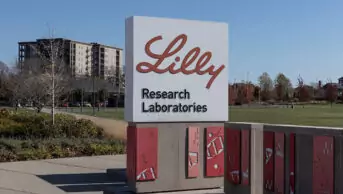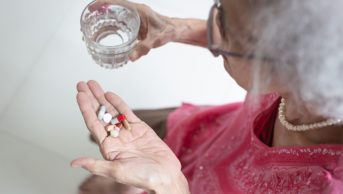
Shutterstock.com
Nearly 40% of acute trusts in England do not offer any non-pharmacological therapies to help manage symptoms such as distress, aggression and agitation in patients with dementia while they are in hospital, The Pharmaceutical Journal can reveal.
Admission to hospital can be a disorientating experience for patients with dementia, with National Institute for Health and Care Excellence (NICE) guidance recommending patients are offered a range of non-drug therapies to improve wellbeing and help them adjust to strange surroundings.
NICE recommends offering treatments such as group cognitive stimulation therapy and to consider offering group reminiscence therapy, cognitive rehabilitation or occupational therapy to those with mild-to-moderate dementia, rather than potentially harmful drugs such as antipsychotics, which are discouraged in all but the most distressed patients.
However, data obtained by The Pharmaceutical Journal under the Freedom of Information (FOI) Act reveal that under a fifth (17%) of the 87 acute trusts who responded offered all of the non-drug therapies suggested by NICE. Just under 45% of acute trusts said that they offered one or more of the therapies in the NICE guidance, but 39% said that they did not offer any.
Responding to the FOI request, some NHS trusts said that patients with dementia could be referred to services in the community, but NHS figures show that 44,000 patients with dementia remain on antipsychotics.
Experts say the variation in access to alternative treatments is worrying.
Karen Harrison Dening, head of research and publications at Dementia UK, said the data obtained by The Pharmaceutical Journal were “a concern”.
“Depending on where you are in the country, you could have a very different experience of dementia care,” she added. “Some services might say they provide cognitive stimulation therapy, for example, but you often find it’s not open to everyone, but targeted towards only a few individuals or in certain circumstances.
“It needs to be mandated in all localities that all services and providers work together in a proper strategic way,” she added.
Anne Child, pharmacy and dementia specialist lead at the Royal Masonic Benevolent Institution Care Company, which operates 18 care homes in England and Wales, said: “Hospital is a difficult place to navigate when you have dementia. Your world becomes smaller and even very familiar environments can eventually challenge you, so to be physically unwell and then in a strange environment must be very difficult for a person with dementia.”
Child said that a “holistic” approach, including non-pharmacological approaches, was necessary to limit distress in patients while they are in hospital.
“You [need to] look at that person as an individual and consider the non-pharmacological interventions that might support them, so you can formulate a support plan that limits their distress or recognises the precursors to what drives that distress.”
Sarah Bryan, lead clinical nurse specialist for older adults and frailty at Chelsea and Westminster NHS Foundation Trust, which provides weekly reminiscence sessions on its wards, said that for many trusts, financial constraints may have played a role in their ability to offer these services. “Financial limitations are potentially problematic for trusts. [Providing non-pharmacological therapies] has been a very clear priority for our hospital — other trusts have struggled in that respect as clinical priorities have required the investment, so they’re still catching up.”
Responding to the FOI figures, a spokesperson for the NHS said: “The NHS has diagnosed a record number of people with dementia in the past year, with the proportion of people given this kind of drug actually falling year on year, building on progress since 2005 which has seen the dementia diagnosis rate double and the prescription of antipsychotic drugs fall by half.”
Sally Copley, director of policy at the Alzheimer’s Society, said: “People often enter hospital at crisis point, due to a lack of support in the community.”
“Too often in the past, people who have been disoriented in hospital have been prescribed antipsychotics to control their behaviour. It is crucial that systems are put in place before and after admission to enable people with dementia to access and benefit from non-drug treatments that can support their wellbeing without relying on drugs”
Copley said that hospitals can be a “difficult and scary place” for people with dementia and that it was “concerning” that the FoI data showed that many acute trusts were unable to offer appropriate alternatives to drugs to support patients with dementia. However, she added that it was important to recognise that alternative therapies are often offered by specialist memory services through Mental Health Trusts and wider community services.
“To improve the lives of people living with dementia, we need to ensure that everyone with dementia can access therapies as recommended by NICE guidance, and pharmacological interventions are only where appropriate and according to their individual needs,” she said.
- This article was updated on 20 February 2020
Special report: Non-drug interventions
This article is part of a special report on the increasing use of non-pharmacological treatments in the health service. Click here to find out more.


